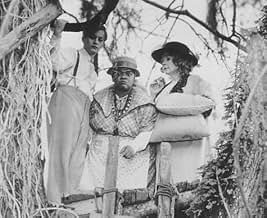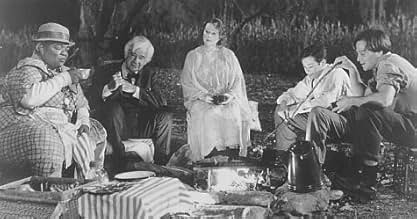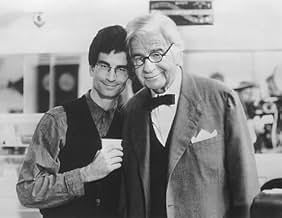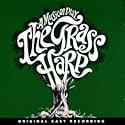Al convertirse en huérfano en 1935, Collin se muda con las primas de su padre, Verena y Dolly. Verena es una mujer de negocios rica y mandona. Dolly, Collin y la criada se rebelan y se mudan... Leer todoAl convertirse en huérfano en 1935, Collin se muda con las primas de su padre, Verena y Dolly. Verena es una mujer de negocios rica y mandona. Dolly, Collin y la criada se rebelan y se mudan a una casa en el árbol.Al convertirse en huérfano en 1935, Collin se muda con las primas de su padre, Verena y Dolly. Verena es una mujer de negocios rica y mandona. Dolly, Collin y la criada se rebelan y se mudan a una casa en el árbol.
- Dirección
- Guión
- Reparto principal
- Premios
- 3 premios en total
Reseñas destacadas
Walter Matthau is retired Judge Cool, a sensible elderly man who "good" people consider a nut (he openly admits that there was nothing wrong with a true love affair between a white man and an African-American woman which led to the white man being run out of town). Matthau is having problems in his home with an unsympathetic grown son and the son's wife. Matthau's wife has died years before. Others in this well cast film include Jack Lemmon as a Dr. Ritt from Chicago, whom Spacek brings back home - and whom accidentally sets in motion the delayed rebellion of Laurie and the others against Spacek's stiff and respectable regime. Joe Don Baker plays the local chicken rancher/part-time sheriff (who hates having to cow-tow to Spacek). Charles Durning is the local minister, who is out for only respectable religious leaders (with Bonnie Bartlett as his equally stuffy wife). Mary Steenburgen is the religious threat - an unmarried mother of twelve who has a mobile revival tent in the back country, but whom is pretty likable for all one's questions about her revivalism. Sean Patrick Flannery is Riley, a young man who lives unconventionally, but whom turns out to be a pretty good friend to Collin. Roddy McDowall (in one of his last roles) plays Amos, the local barber.
Basically Capote uses his characters to punch holes in what "nice, conventional" small town people believe is proper behavior. Spacek is the leader of these people, who believe in organized Christianity, hard work and business, and straight-laced morality. Laurie, Matthau, Carter, Flannery, Steenburgen, and Furlong are all believers in doing what is natural, and from the heart. So as they begin working together they become a model and a danger for the "nice people". But as the tale progresses, the nice people find that what they believe in does not emotionally satisfy them. Indeed Spacek suffers several losses in the course of the film that she never expected.
Charles Matthau, Walter's son, directed this (very nicely - it is one of the best ensemble movies of recent years). It was also a rarity in the 1990s decade of Matthau-Lemmon films. Whereas GRUMPY OLD MEN, GRUMPIER OLD MEN, OUT TO SEA, and THE ODD COUPLE II were all comedies, this film is dramatic and the two actors only shared one scene (with Roddy McDowall in his barber shop) in the film. Also, Lemmon's character is less likable than usual in this film.
The title, by the way, refers to a statement by Laurie's character about how the grass gives off a music like a harp, which is actually the voices of all the people who ever inhabited the earth. It becomes a running metaphor in the film up to the conclusion.
Capote loosely based his 1951 "The Grass Harp" novella on the eccentric maiden cousins of his childhood. For the film Piper Laurie plays good Aunt Dolly and Sissy Spacek bad Aunt Verena (who is even less likable than Pollyanna's Aunt Polly). Spacek gets to do something out of character and nicely underplays this one. Laurie gets to have even more fun and turns in a joyful performance. She is a little too good to be true but Laurie manages to sell the character with a remarkable performance. In the 1950's Laurie was an extremely pretty (and hot) young starlet but it is obvious from this and her performance in "Carrie" (playing Spacek's mother) that there was a lot of substance in that pretty package.
Edward Furlong (best know as John Conner in "Terminator 2") avoids the "Pollyanna" trap and is pretty easy to take. The coming-of-age side of the story works quite well.
"The Grass Harp" is a bit underrated, probably because the screenplay fails to capture the lyrical quality of Capote's storytelling, giving the viewer a surfeit of sentimentality compounded by a too sweet score. The title is a reference to the musical sound of blowing grass, a metaphor about intergenerational connections and the primary theme of the story.
The film would have benefited from a little more restraint. This is not a fatal flaw but the film would have been more powerful with Mockingbird's toned down production design and less colorful characters; maybe even going so far as to release it in black and white.
Those looking for action adventure and hot romance should look elsewhere. But there are a lot of "Mockingbird" fans out there who should really enjoy "The Grass Harp".
Then again, what do I know? I'm only a child.
Having said that, the one criticism I have of the movie is that I didn't really CARE about the characters. I enjoyed very much watching the characters interact, and being reminded of life in a world that has almost completely disappeared. But I was more amused by them than passionate about them.
While this film may not be perfect, it's a wonderful movie; more intelligent than at least 90% of what comes out of Hollywood. As another reviewer suggested, if you have a couple of hours of quiet time, sit down with a glass of wine and enjoy.
¿Sabías que...?
- CuriosidadesIn "Carrie" (1976), Piper Laurie and Sissy Spacek played mother and daughter, respectively. Here, they play sisters.
- PifiasWhen the men fall out the treehouse and land on the ground, the leaves slide in a large square revealing the crash pad.
- Citas
Mrs. Peters: Shame on you Dolly Talbo, sittin up in that tree like a drunken Indian, smoking on cigarettes like a common... Floozy
Mrs. Buster: Floozy
Catherine Creek: Preacher lady don't you be callin Ms. Dolly here no floozy now, why I come down there and slap you bow-legged.
- ConexionesReferenced in Walter Matthau: Diamond in the Rough (1997)
- Banda sonoraRock of Ages
Written by Augustus Montague Toplady, Thomas Hastings
Performed by Bonnie Bartlett, Charles Durning
Selecciones populares
- How long is The Grass Harp?Con tecnología de Alexa
Detalles
- Fecha de lanzamiento
- País de origen
- Sitio oficial
- Idioma
- Títulos en diferentes países
- The Grass Harp
- Localizaciones del rodaje
- Empresas productoras
- Ver más compañías en los créditos en IMDbPro
Taquilla
- Presupuesto
- 8.000.000 US$ (estimación)
- Recaudación en Estados Unidos y Canadá
- 559.771 US$
- Fin de semana de estreno en EE. UU. y Canadá
- 117.161 US$
- 13 oct 1996
- Recaudación en todo el mundo
- 559.771 US$
- Duración1 hora 47 minutos
- Color
- Mezcla de sonido
- Relación de aspecto
- 1.85 : 1
Contribuir a esta página

























